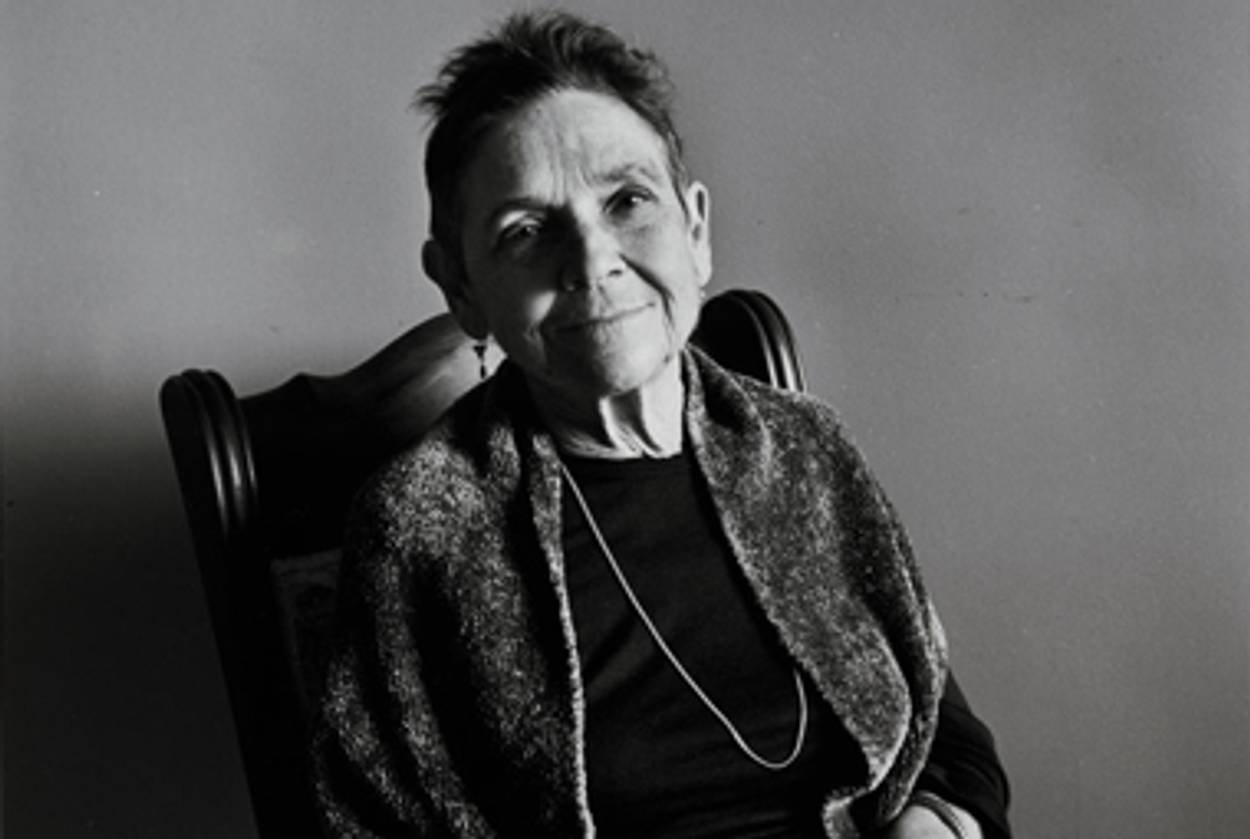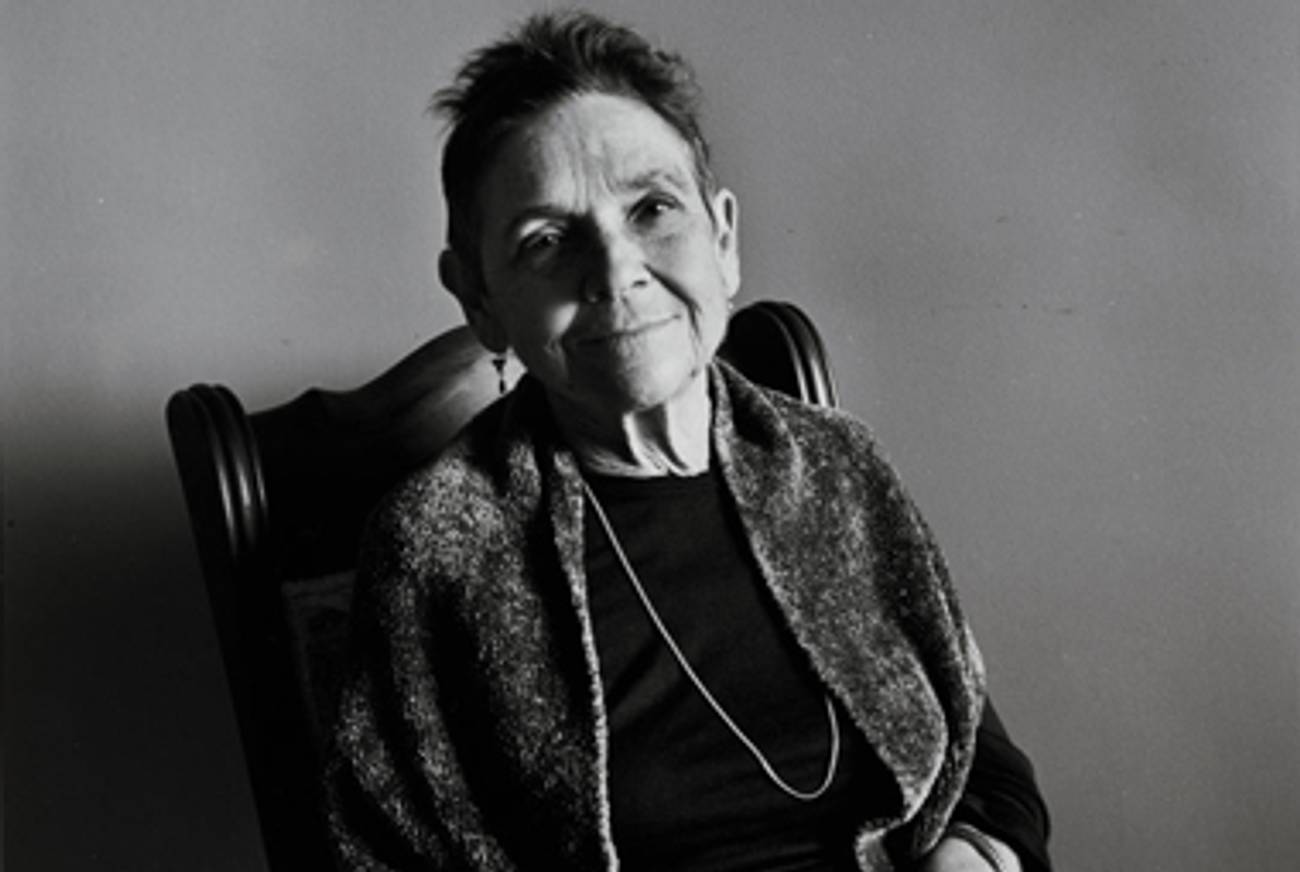Words Fail
In her new collection, Tonight No Poetry Will Serve, Adrienne Rich reckons with the question of how to write lyric poetry in the face of war and economic hardship




Back in the heyday of identity politics, the conviction that “the personal is political” allowed the intimate poetry of the everyday to take on the big social issues. America has always produced good political poetry. We have had our Whitmans and our Ginsbergs and our Robert Lowells. But in the late Sixties and the Seventies, the notion that daily experience could really count lent poems a new urgency.
For more than five decades Adrienne Rich has written urgently. Her books have presented themselves as the latest reports from the front, and Rich has fought on several fronts.
She has, as the saying goes, lived the contradictions. A Fifties good girl and Sixties feminist, a lesbian mother and baptized Jew, she has cast herself as a speaker for the dead, the oppressed, and the forgotten. In the poem “Diving into the Wreck,” one of her most famous manifestoes, she presents herself as a Jacques Cousteau of the battered spirit, bent on salvaging the wreckage of history:
I am she: I am he
whose drowned face sleeps with open eyes
whose breasts still bear the stress
whose silver, copper, vermeil cargo lies
obscurely inside barrels
half-wedged and left to rot
we are the half-destroyed instruments
that once held to a course
the water-eaten log
the fouled compass
We are, I am, you are
by cowardice or courage
the one who find our way
back to this scene
carrying a knife, a camera
a book of myths
in which
our names do not appear.
She is able to save the arrogant bravery of this stance by insisting that she is part of an “us.” She is claiming that her single—and singular—person can stand in for the collective. For a generation of feminists, it did.
It’s been almost 40 years since “Diving into the Wreck.” In spite of the importance of issues like gay marriage, identity politics aren’t as important any more. Many of our old concerns—like war and the economy—have returned as new concerns. Rich has moved with the times. She devotes a number of the poems in her most recent book, Tonight No Poetry Will Serve, to her opposition to our conflicts in Iraq and Afghanistan and to a defense of the poor.
But her poetry doesn’t always keep up with her commitments. Some of the new poems are just too obvious, such as the “Ballade of the Poverties”:
You who travel by private jet like a housefly
Buzzing with the other flies of plundered poverties
Princes and courtiers who will never learn through words
Here’s a mirror you can look into: take it: it’s yours.
A poem of witness and prophecy, to be sure, but its archaisms (princes and courtiers) are not archetypes but clichés. Attacking the masters of the universe is too easy.
Rich knows this and the pun in her title poem shows that she realizes what is at stake. Poetry should refuse to serve the powerful, but in a time of clandestine torture and extraordinary rendition, lyric poetry just won’t do:
Saw you walking barefoot
taking a long look
at the new moon’s eyelid
later spread
sleep-fallen, naked in your dark hair
asleep but not oblivious
of the unslept unsleeping
elsewhere
Tonight I think
no poetry
will serve
Synatx of rendtion:
verb pilots the plane
adverb modifies action
verb force-feeds noun
submerges the subject
noun is choking
verb disgraced goes on doing
now diagram the sentence
This begins as a love poem or at least a poem of desire: a woman looking at another woman (is she imagining herself?) in a pastoral, then an intimate setting. That woman might be aware of the “unslept unsleeping elsewhere” but her awareness isn’t enough. Poetry—especially lyric poetry of a very traditional kind—doesn’t cut it. Perhaps no language will. Torture goes beyond poetry. It exceeds grammar.
This poem clearly separates the political from the personal because they don’t quite overlap for the poet. And that is generally true of Tonight No Poetry Will Serve. The political poems are brittle and self-righteous precisely because they don’t draw on Rich’s best muse: her experience. The personal poems in Tonight No Poetry Will Serve are more supple, especially those on poetry’s most traditional, existential subjects—love, loss, and death:
Called in to the dead: why didn’t you write?
What should I have asked you?
—what would have been the true
unlocking code
if all of them failed—
I’ve questioned the Book of Questions
studied gyres of steam
twisting from the hot cup
in a cold sunbeam
turned the cards over lifted the spider’s foot
from the mangled hexagon
netted the beaked eel from the river’s mouth
asked and let it go
Perhaps the big mysteries suit her. As she says: “[T]here’s a divide/ between the shores of sickness and the legendary purifying/ river of death You will have this tale to tell, you will have to live/ to tell/ this tale.” At 81, Rich is a survivor in the most literal sense. This is her experience now and might well be her tale.
***
Andrea Cohen’s often lovely, sometimes loopy, poetry circulates between death and comfort, between images of inexorable loss and expressions of inexplicable hope. In Kentucky Derby, which just came out, she writes poems with odd titles like “Love Poem with a Trash Compactor” and “Coupons in the Afterlife.” These provide good indications of her m.o. She likes to take slightly outlandish metaphors or odd juxtapositions and coax them wittily back to sense.
At the same time, though, Cohen is capable of writing “Transport,” in which she introduces Lena, a German woman who taught her how to forge railway tickets:
It’s what Lena’s mother learned from her mother,
who tucked her in 1940 into the Black Forest,
into a train alone beneath a black
and star-starved sky, her own yellow
star torn off and burned, her mother
somewhere back there, not waving, burning.
The last image might not be all that surprising in a poem about the Shoah, but it is rendered stranger by its nod to a famously dark work by the English poet Stevie Smith, “Not Waving But Drowning.” It is also made more poignant—almost painfully so—by the notion that Lena’s grandmother’s sacrifice is as tender and as natural as a parent putting a child to bed.
A similar evocation of parental care is given a wide and positively redemptive turn in the title poem of the book. It begins, typically, with what appears to be a joke: “Next year in Jerusalem,/ with mint juleps. This year/ in Peterborough with Wyatt and Anna.” The messianic affirmation of the Seder is Americanized with that mint julep and then deflated and deferred. The poem meanders through an account of watching the race, remembering her uncle’s mynah bird, drinking a little beer and heading back to the McDowell Writer’s Colony, which, she tells us, is “my version of Eden.”
McDowell would be any author’s paradise, but for Cohen it is not the leisure to write that is enchanting. It’s something more communal and much more dream-like:
We are all
made of honey and butter and one of us has a yellow
school bus which we board from time to time
for a field trip that involves riding in circles
and falling asleep, which involves
all of us being ponies in a meadow.
The sea and sky are made of grass.
It can’t last. It lasts.
The yellow star has become a school bus that goes nowhere but around and does it so safely and reassuringly that its riders fall asleep, become ponies in a land that is so full of milk (or butter) and honey that the very sky is made of grass. A realist would say that a dream like that is just plain childish and that a state of bliss like that just couldn’t last. A utopian would say that it isn’t and that it can. In the end, our redemption is nothing less than the promise of such plenty and such peace.
David Kaufmann teaches literature at George Mason University.
David Kaufmann teaches literature at George Mason University.